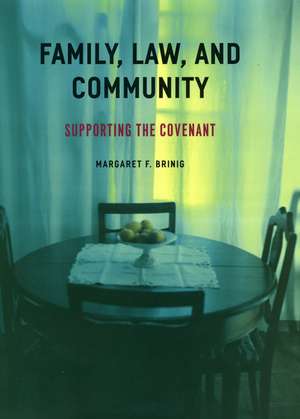Family, Law, and Community: Supporting the Covenant
Autor Margaret F. Brinigen Limba Engleză Hardback – 24 mai 2010
Concentrating on legal reform, Brinig examines a range of subjects, including cohabitation, custody, grandparent visitation, and domestic violence. She concludes that conventional legal reforms and the social programs they engender ignore social capital: the trust and support given to families by a community. Traditional families generate much more social capital than nontraditional ones, Brinig concludes, which leads to clear rewards for the children. Firmly grounded in empirical research, Family, Law, and Community argues that family policy can only be effective if it is guided by an understanding of the importance of social capital and the advantages held by families that accrue it.
Preț: 339.89 lei
Preț vechi: 425.48 lei
-20% Nou
Puncte Express: 510
Preț estimativ în valută:
65.05€ • 67.20$ • 54.13£
65.05€ • 67.20$ • 54.13£
Carte indisponibilă temporar
Doresc să fiu notificat când acest titlu va fi disponibil:
Se trimite...
Preluare comenzi: 021 569.72.76
Specificații
ISBN-13: 9780226074993
ISBN-10: 0226074994
Pagini: 288
Ilustrații: 14 halftones, 26 tables
Dimensiuni: 152 x 229 x 23 mm
Greutate: 0.54 kg
Editura: University of Chicago Press
Colecția University of Chicago Press
ISBN-10: 0226074994
Pagini: 288
Ilustrații: 14 halftones, 26 tables
Dimensiuni: 152 x 229 x 23 mm
Greutate: 0.54 kg
Editura: University of Chicago Press
Colecția University of Chicago Press
Notă biografică
Margaret F. Brinig is the Fritz Duda Family Chair in Law and associate dean for faculty research at Notre Dame Law School. She is the author of several books, including, most recently, From Contract to Covenant: Beyond the Law and Economics of the Family.
Cuprins
Acknowledgments
Introduction
I. Norms, Families, and Community
Chapter 1. The Relationship between Trust and Community Recognition
Chapter 2. Norms within Families, or the Family Community
II. The Boundaries of Family Communities
Chapter 3. The Limits of Community and the Role of Autonomy
Chapter 4. Reaching the Limit: Granting Insiders and Outsiders Rights
III. Families, Mimetics, and Community
Chapter 5. The Family as “Little Commonwealth”: The Role of Mimetics
Chapter 6. What Happens When Trust Fails? Mimetics in Families Gone Wrong
Conclusion
Notes
Index
Introduction
I. Norms, Families, and Community
Chapter 1. The Relationship between Trust and Community Recognition
Chapter 2. Norms within Families, or the Family Community
II. The Boundaries of Family Communities
Chapter 3. The Limits of Community and the Role of Autonomy
Chapter 4. Reaching the Limit: Granting Insiders and Outsiders Rights
III. Families, Mimetics, and Community
Chapter 5. The Family as “Little Commonwealth”: The Role of Mimetics
Chapter 6. What Happens When Trust Fails? Mimetics in Families Gone Wrong
Conclusion
Notes
Index
Recenzii
“This valuable and original work showcases Margaret Brinig’s wide-ranging talents and deep understanding of family life. She is the rare scholar who can comfortably weave together insights from sociological theory, judicial decisions, high-tech econometric studies—and, so appropriately in the domestic sphere, the possibility of unconditional love.”
“This is an important, innovative book that addresses some of the hottest topics in family law. Brinig brings impressive skills and a sophisticated command of the law to the task of assessing and reforming family policy. Her fresh insights are bound to provoke debate.”--Barbara Woodhouse, Emory University
“There is no one better than Brinig at combining social science, policy analysis, values, and common sense to bring clarity to the toughest questions in family law. Even where one might be tempted to disagree with Brinig’s ultimate conclusions, one always leaves her work seeing the debates in a way completely different from the way one saw them before. And there is no greater compliment I can think of for a scholar.”
“This fine book shows why Margaret Brinig is America’s leading family-law scholar. She anchors her arguments in both sound legal scholarship and her own high-quality empirical research. Her work in this book corrects individualistic trends in family law theory towards the dogma of ‘private ordering’ and restores the role that law can play in creating trust and community support for today’s troubled families. A great book.”
“This is an important, innovative book that addresses some of the hottest topics in family law. Brinig brings impressive skills and a sophisticated command of the law to the task of assessing and reforming family policy. Her fresh insights are bound to provoke debate.”--Barbara Woodhouse, Emory University
“There is no one better than Brinig at combining social science, policy analysis, values, and common sense to bring clarity to the toughest questions in family law. Even where one might be tempted to disagree with Brinig’s ultimate conclusions, one always leaves her work seeing the debates in a way completely different from the way one saw them before. And there is no greater compliment I can think of for a scholar.”
